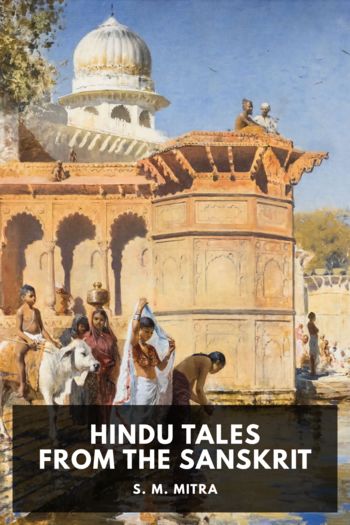Hindu Tales from the Sanskrit, S. M. Mitra [top books to read .txt] 📗

- Author: S. M. Mitra
Book online «Hindu Tales from the Sanskrit, S. M. Mitra [top books to read .txt] 📗». Author S. M. Mitra
This is the story of four creatures, none of whom loved each other, who lived in the same banyan tree in a forest in India. Banyan trees are very beautiful and very useful, and get their name from the fact that “banians,” as merchants are called in India, often gather together in their shade to sell their goods. Banyan trees grow to a very great height, spreading their branches out so widely that many people can stand beneath them. From those branches roots spring forth, which, when they reach the ground, pierce it, and look like, columns holding up a roof. If you have never seen a banyan tree, you can easily find a picture of one in some dictionary; and when you have done so, you will understand that a great many creatures can live in one without seeing much of each other.
In an especially fine banyan tree, outside the walls of a town called Vidisa, a cat, an owl, a lizard and a mouse, had all taken up their abode. The cat lived in a big hole in the trunk some little distance from the ground, where she could sleep very cosily, curled up out of sight with her head resting on her forepaws, feeling perfectly safe from harm; for no other creature, she thought, could possibly discover her hiding-place. The owl roosted in a mass of foliage at the top of the tree, near the nest in which his wife had brought up their children, before those children flew away to seek mates for themselves. He too felt pretty secure as long as he remained up there; but he had seen the cat prowling about below him more than once, and was very sure that, if she should happen to catch sight of him when he was off his guard seeking his prey and obliged to give all his attention to what he was doing, she might spring out upon him and kill him. Cats do not generally attack such big birds as owls, but they will sometimes kill a mother sitting in her nest, as well as the little ones, if the father is too far off to protect them.
The lizard loved to lie and bask in the sunshine, catching the flies on which he lived, lying so still that they did not notice him, and darting out his long tongue suddenly to suck them into his mouth. Yet he hid from the owl and the cat, because he knew full well that, tough though he was, they would gobble him up if they happened to be hungry. He made his home amongst the roots on the south side of the tree where it was hottest, but the mouse had his hole on the other side amongst damp moss and dead leaves. The mouse was in constant fear of the cat and the owl. He knew that both of them could see in the dark, and he would have no chance of escape if they once caught sight of him.
IIThe lizard and the mouse could only get food in daylight; but the lizard did not have to go far for the flies on which he lived, whilst the mouse had a very dangerous journey to take to his favourite feeding place. This was a barley field a short distance from the banyan tree, where he loved to nibble the full ears, running up the stalks to get at them. The mouse was the only one of the four creatures in the banyan tree who did not feed on others; for, like the rest of his family, he was a vegetarian, that is to say, he ate nothing but vegetables and fruit.
Now the cat knew full well how fond the mouse was of the barley-field, and she used to keep watch amongst the tall stems, creeping stealthily about with her tail in the air and her green eyes glistening, expecting any moment to see the poor little mouse darting hastily along. The cat never dreamt that any danger could come to her, and she trod down the barley, making quite a clear path through it. She was quite wrong in thinking herself so safe, for that path got her into very serious trouble.
It so happened that a hunter, whose great delight was to kill wild creatures, and who was very clever in finding them, noticing every little thing which could show him where they had passed by, came one day into the barley-field. He spied the path directly and cried, “Ha! ha! Some wild animal has been here; not a very big one; let’s have a look for the footprints!” So he stooped down to the ground, and very soon saw the marks of pussy’s feet. “A cat, I do believe,” he said to himself, “spoiling the barley she doesn’t want to eat herself. I’ll soon pay her out.” The hunter waited until the evening lest the creature should see what he was going to do, and then in the twilight he set snares all over the barley-field. A snare, you know, is a string with a slipknot at the end of it; and if an animal puts his head or one of his paws into this slipknot and goes on without noticing it, the string is pulled tight and the poor creature cannot





Comments (0)